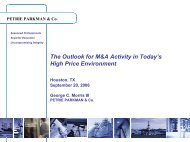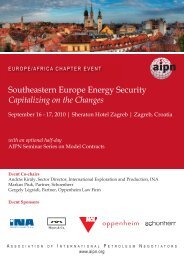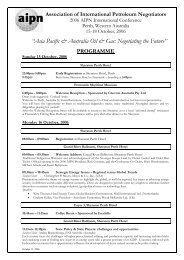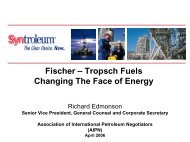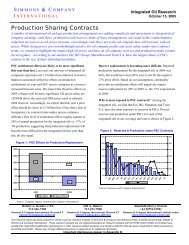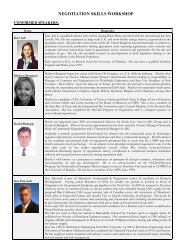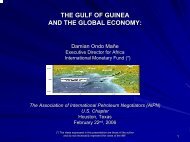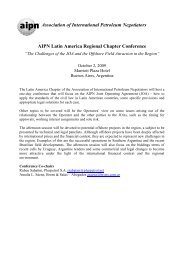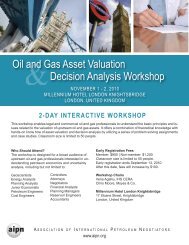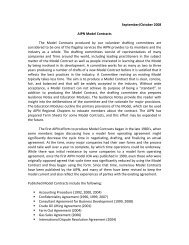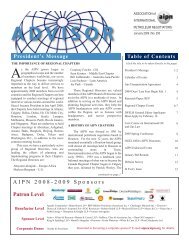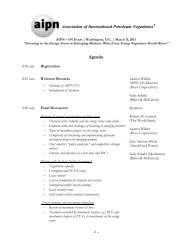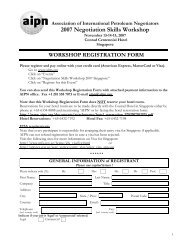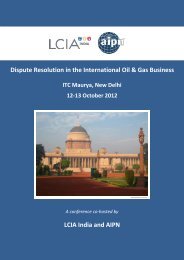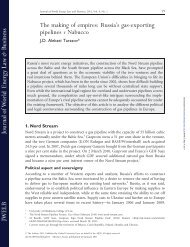ADVISOR - AIPN
ADVISOR - AIPN
ADVISOR - AIPN
You also want an ePaper? Increase the reach of your titles
YUMPU automatically turns print PDFs into web optimized ePapers that Google loves.
Indonesian PSC),<br />
• Improved petroleum recovery contract/performance<br />
compensation contracts (akin to a risk service contract), and<br />
• Reactivation of suspended fields contracts.<br />
Thus, while there may be other reasons to restructure the energy<br />
sector, there should be no need to redefine or restructure the<br />
current contractual structure to fit the forms of investment<br />
authorized by GL-17 as “new investment” in the “economic<br />
development of resources in Burma.”<br />
Limitations on GL-17<br />
Caveat Investor: Burmese Sanctions regulations Not repealed.<br />
It is important to note that GL-17 does not repeal the broad<br />
sanctions regime comprising the Burmese Sanctions Regulations<br />
or the various federal laws and Executive Orders that underlie the<br />
Regulations, all of which are still in effect. 26 As emphasized in the<br />
Treasury Department's Press Release, “The core authorities<br />
underlying our sanctions remain in place.” 27 Instead, the President<br />
invoked his authority to waive the ban on new investment and<br />
authorized the issuance of a general license permitting new<br />
investments in Myanmar. GL-17 has no stated duration, either by<br />
law or its own terms, and may be revoked by OFAC at any time,<br />
which would have the effect of reinstating the prohibition on new<br />
investments in Myanmar, including oil and gas investments. Any<br />
future action along these lines would likely be dictated by the pace<br />
and direction of political and economic reform by the Myanmar<br />
government, whose progress prompted suspension of the ban on<br />
new investment in the first place.<br />
restrictions on Transactions with Ministry of Defense and SDNs.<br />
It is important to observe that GL-17 has not lifted the ban on new<br />
investments with all counterparties in Burma. GL-17 proscribes<br />
new investments through the Burmese Ministry of Defense,<br />
including the Office of Procurement, any state or non-state armed<br />
group, and any entity in which any of the foregoing owns a 50<br />
percent or greater interest. 28 GL-17 preserves the ban on new<br />
investments with any person named in the Specially Designated<br />
Nationals and Blocked Persons List (“SDN List”) published by<br />
OFAC. 29<br />
Given the recent political and military history in Myanmar, it<br />
is not surprising that these restrictions on new investments have<br />
been included in GL-17 30 and thus should not be taken lightly.<br />
Although the standard avenue of investment in the oil and gas<br />
sector in Myanmar is through public auction or direct negotiation<br />
with MOGE, if a U.S. investor wishes to acquire an oil and gas<br />
interest in Myanmar through farm-in or share acquisition, it will<br />
SEPTEMBER 2012 • 28<br />
Eased Sanctions Widen Doorway to Myanmar Oil and Gas Sector<br />
be important to ensure that any such new investment is<br />
sufficiently diligenced to ensure that it does not trigger one of<br />
these exceptions to GL-17. It also will be important for new<br />
investors to be able to demonstrate to OFAC, if challenged, that<br />
sufficient inquiry has been done to avoid dealings with<br />
unauthorized parties.<br />
reporting requirements. GL-17 imposes two sets of mandatory<br />
reporting requirements applicable to “new investments” that will<br />
apply to new investments in the Myanmar oil and gas sector, and<br />
it incorporates by reference the Department of State’s “Reporting<br />
Requirements on Responsible Investment in Burma.” 31 Notably,<br />
the Department of State, rather than OFAC, has jurisdiction over<br />
this reporting regime.<br />
MOGE Investment Notficaton. Any U.S. person who has<br />
undertaken a new investment pursuant to an agreement entered<br />
with MOGE must notify the Department of State in writing within<br />
60 days of its investment.<br />
At the moment, the interpretation of “new investments” that<br />
are subject to the reporting requirement remains unclear. OFAC’s<br />
definition of “new investments” contemplates both direct and<br />
indirect investments, and, as a result, we believe it is likely that<br />
OFAC would interpret the reporting requirement to include farmins<br />
and share purchases. However, the Department of State has<br />
not yet indicated that OFAC’s definition and guidance regarding<br />
“new investments” will apply to the new reporting regime.<br />
Annual Reportng Requirement. In addition to the MOGE<br />
reporting requirement, GL-17 imposes an annual reporting<br />
requirement affecting all new investments, whether in the oil and<br />
gas sector or elsewhere, which is due on April 1 each year. One<br />
report is required to be made available to the public (“Public<br />
Report”), and the other report is required to be provided only to<br />
the government (“Government Report”). The annual reporting<br />
requirement is intended to help the U.S. government assess the<br />
effects of investments made under the new sanctions regime. The<br />
reporting scheme also allows investors to claim an exemption<br />
under Exemption 4 of the Freedom of Information Act (“FOIA”)<br />
and establishes a process to prevent the disclosure of such<br />
information to the public.<br />
Public report<br />
The following principal information must be included in the Public<br />
Report:<br />
• An overview of operations in Myanmar;<br />
26 For example, sanctions on the imports of “products of Burma” remain in place, which could pose an issue for U.S. oil and gas companies that wish to import production to the U.S. See 31<br />
CFR § 537.203. The prohibition on the import of “products of Burma” in Section 3(a)(1) of the Burmese Freedom and Democracy Act of 2003 was extended as of July 26, 2011, for an additional<br />
year. At the time of this publication, H.R. 5986, a bill to extend the import restrictions for another three-year period, was being considered by the House. However, as a practical matter, it is<br />
likely that regional markets will readily absorb any production coming out of Myanmar in the near term.<br />
27 Joint Fact Sheet from U.S. Treasury and State Departments: “Administration Eases Financial and Investment Sanctions on Burma,” July 11, 2012 (“Joint Fact Sheet”).<br />
28 Paragraph (c), GL-17.<br />
29 Paragraph (d), GL-17. See also Executive Order No. 13619, issued July 11, 2012. The SDN List is accessible through OFAC’s web site at http://www.treasury.gov/sdn.<br />
30 The Joint Fact Sheet states that the “United States remains concerned about … the role of the military in the Burmese economy.”<br />
31 Paragraph (e), GL-17 and “Reporting Requirements on Responsible Investment in Burma,” accessed at http://www.humanrights.gov/wp-content/uploads/2012/07/Burma-Responsible-<br />
Investment-Reporting-Reqs.pdf (“Reporting Requirements”). The Reporting Requirements are pending approval by the Office of Management and Budget as of July 11, 2012.



